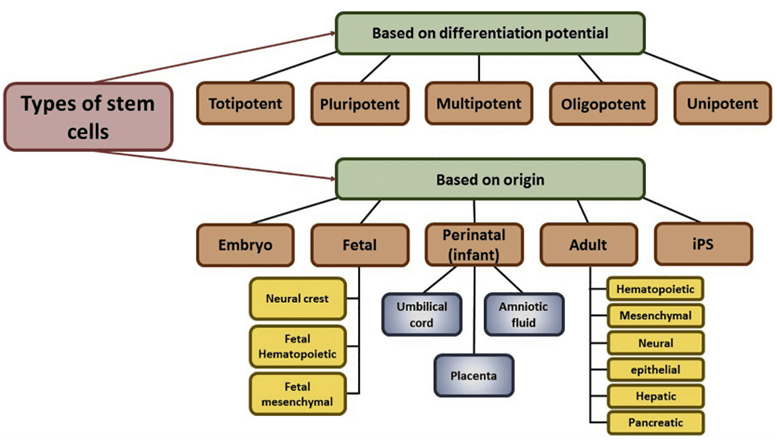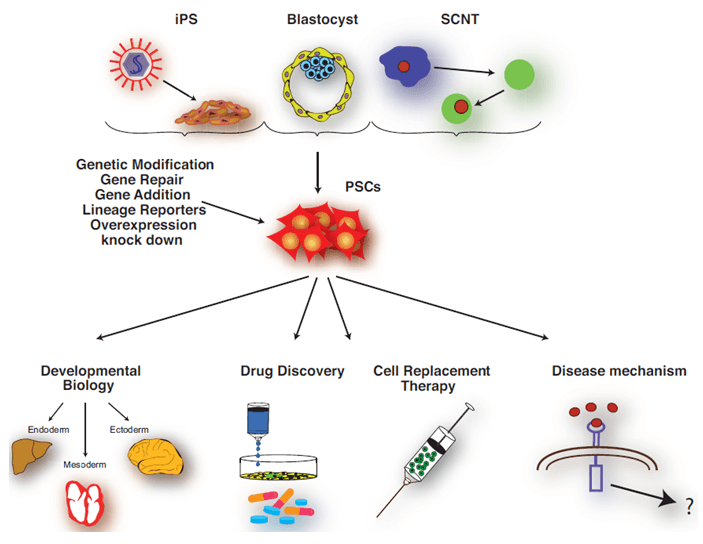Stem Cell Isolation and Culture Services
Creative Bioarray has extensive experience in isolating and culturing various kinds of stem cells from different tissues. Our expert scientists have the ability to design a customized solution to compliment your unique research needs of stem cells.
About Stem Cells
Stem cells are undifferentiated cells with the unique ability to develop into specialized cell types as the body needs them, and an enormous capacity for self-renewal to maintain the undifferentiated state. They are the body's natural reservoir. Stem cells can replenish stocks of used up or damaged cells. They are essential to maintain tissues and keep normal functions of the body.
Stem cells can be classified in different ways. They can be mainly classified into embryonic stem cells, adult stem cells and induced pluripotent stem cells (iPSCs) according to the basis of their resources. Stem cells can also be classified by their differentiation potential. They can be divided into totipotent stem cells capable of differentiation into all possible cell types, multipotent stem cells capable of differentiation into a closely related family of cells, pluripotent stem cells capable of differentiation into almost all cell types, oligopotent stem cells capable of differentiation into a few cells, and unipotent stem cells capable of producing only their own cell types.
 Figure 1. Classification of stem cells. (Barzegar, M., et al., 2019)
Figure 1. Classification of stem cells. (Barzegar, M., et al., 2019)
Applications of Stem Cells
Stem cells have a very broad application prospect in the field of life sciences, such as developmental biology, cell biology, pathology and pharmacology.
- Used to study development and gene function.
By following the division and differentiation of stem cells and studying the related genes, scientists can better understand how a complex organism develops from a fertilized egg, as well as the gene functions in different stages of embryo developmental.
- Used to study the pathogenicity of diseases.
Some of the serious diseases are due to abnormal cell division and differentiation. Stem cells are useful tools to better understand the molecular and genetic control of these diseases.
- Used to treat diseases.
Stem cells can be used to replace damaged cells and tissues. They have the potential to be seed cells for cell therapy and tissue replacement therapy. Stem cells, such as hematopoietic stem cells and bone marrow mesenchymal stem cells, can also be used as carriers of gene therapy for disease treatment.
- Used as biopharmaceutical resources
Embryonic stem cells can be induced into various cell types in vitro. This provides a solid foundation for the establishment of disease cell models, drug screening, pharmacological and toxicology research, and new drug development.
 Figure 2. Pluripotent stem cell sources and their application. (Irion, S., et al., 2018)
Figure 2. Pluripotent stem cell sources and their application. (Irion, S., et al., 2018)
Our Services
- Stem cell isolation
We have successfully isolated multiple types of stem cells from different resources, including embryonic stem cells, adult stem cells, iPSC, and tumor stem cells. Our protocols are adjusted based on the species or stem cell sources.
- Stem cell culture
Stem cell culture is a challenging process. We have an experienced scientific team who can select the best culture system for specific cell type. Stem cells will undergo a series of tests to ensure the purity. Cell growth, self-renewal ability and differentiation potential will also be fully characterized.
Creative Bioarray is dedicated to providing the most approciate methods for stem cell isolation and culture. With our experienced scientists and advanced technique platforms, we can fulfill our customers' research needs. We have comprehensive and customized services to help you cover the difficulties of stem cells and advance your research.
If you are interested in our services, please feel free to contact us. We look forward to working with you.
References:
- Barzegar, M., et al. Potential therapeutic roles of stem cells in ischemia-reperfusion injury. Stem cell research, 2019, 37: 101421.
- Irion, S., et al. Directed differentiation of pluripotent stem cells: from developmental biology to therapeutic applications. Cold Spring Harbor symposia on quantitative biology. Cold Spring Harbor Laboratory Press, 2018, 73, pp: 101-110.
For research use only. Not for any other purpose.

 Figure 1. Classification of stem cells. (Barzegar, M., et al., 2019)
Figure 1. Classification of stem cells. (Barzegar, M., et al., 2019)
 Figure 2. Pluripotent stem cell sources and their application. (Irion, S., et al., 2018)
Figure 2. Pluripotent stem cell sources and their application. (Irion, S., et al., 2018)
